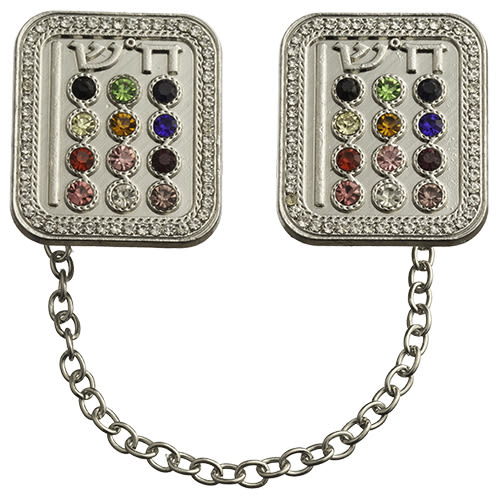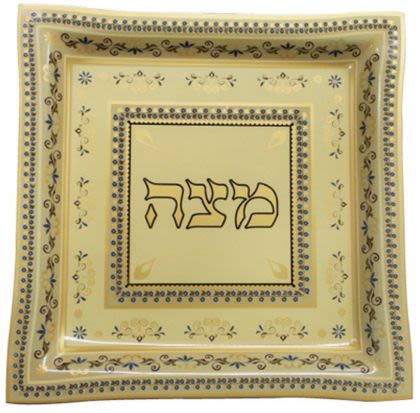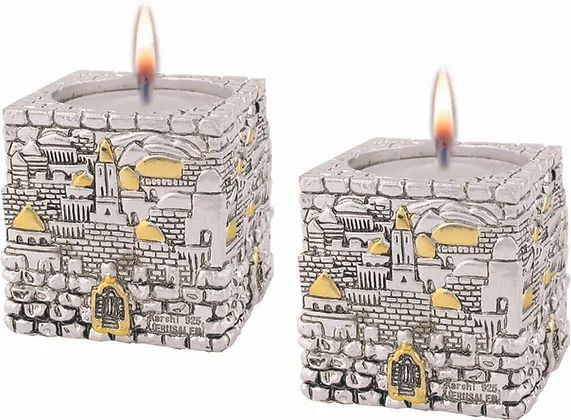
Jealousy
Imagine that your soul-correction and mission in life is to be a jet pilot. Your tailor-made path in life leads you to the cockpit of an F-16...

Imagine that your soul-correction and mission in life is to be a jet pilot. Your tailor-made path in life leads you to the cockpit of an F-16, where you achieve greatness and your objective in life, flying at Mach 1 high above the clouds. Would you be jealous of a person with yacht?
Emuna and Emotions: The ability to be happy with one’s lot and with oneself is from emuna. Hashem gives each of us exactly what we need to accomplish our personal mission in life. What another has would not help us one iota. Therefore, jealously only indicates that one has not begun to live his own purposeful life.
Part 1 – Sadness
Part 2 – Anger
Part 3: Jealousy
With emuna, a person knows that he or she has a unique soul with its own special task and soul- correction on earth. Hashem, by way of His compassionate individual Divine Providence, gives each soul the qualities and conditions it requires to achieve its objectives. With this in mind, the strong believer never falls into the pit of jealousy.
Imagine that your soul-correction and mission in life is to be a jet pilot. Hashem gives you a special set of talents and aptitudes that help you earn your wings. Your tailor-made path in life leads you to the cockpit of an F-16, where you achieve greatness and your objective in life, flying at Mach 1 high above the clouds. Would you be jealous of a person with yacht? Most certainly not!
Living a Purposeful Life
Jealousy is an indication that one hasn’t yet started living a purposeful life. Another person’s fame, fortune, or success doesn’t help any of us attain our soul-correction; therefore, when we gaze at other people’s gifts in life, we fail to develop our own gifts in life, the needed tools in accomplishing what we need to do in this world.
For Helen Keller, blindness was not a handicap – it was a critical tool for her soul-correction; otherwise, she would have never developed Braille. One person’s handicap is therefore another person’s springboard to greatness. If Helen Keller would have been miserable, bitter, and jealous of those who see, she certainly would not have accomplished her mission in life.
The Gomorrah in tractate Taanit tells the story of the generation’s greatest sage, Rebbe Yehoshua ben Chananya. Rebbe Yehoshua was extremely ugly. Caesar’s daughter once chided him and asked, “How is such magnificent wisdom in such an ugly vessel?”
Rebbe Yehoshua smiled, then asked Caesar’s daughter how her father stores his fine wines. “In simple ceramic jugs,” she answered. He laughed and said that it’s ridiculous that Caesar, the richest man in the world, should store his wine in simple earthenware jugs. She agreed, and transferred her father’s best wine to solid gold vessels.
A day or so later, Caesar asked for a glass of his favorite Cabernet. The wine was completely sour. Caesar summoned his royal wine master and demanded an explanation. “Your Majesty,” shrugged the wine master, “the princess ordered me to transfer all the Cabernet into golden vessels!”
Caesar sent for his daughter and demanded her explanation. “It’s not my fault, Father,” she cried, “Rebbe Yehoshua ben Chananya told me to do it!”
Caesar’s guards seized Rebbe Yehoshua ben Chananya and brought him to the royal court. Undaunted, Rebbe Yehoshua said, “Your daughter doesn’t like ugly vessels, Your Majesty; but, wisdom and fine wine are similar, they are both preserved in ugly vessels.”
Rebbe Yehoshua ben Chananya conveyed an important message – just as wine is best preserved in a simple earthenware vessel, so is Torah best preserved in a simple, not-so-beautiful individual. Such a person is far from pride, arrogance, and vanity. Gold – indicative of pride – sours fine wine. Rebbe Yehoshua ben Chananya was a man of complete emuna – he knew that his ugliness was by no means a deficiency, but an important quality necessary in accomplishing his mission on earth.
In light of the above, one person’s deficiency is a valuable tool in another person’s soul- correction. If Rebbe Yehoshua ben Chananya would have been jealous of beautiful people, and if he would have wasted his time in pursuit of physical perfection, he would have become a bitter and frustrated individual that missed the opportunity of becoming one of the greatest minds of all time. When one pursues his or her true purpose in life, there’s no room for jealousy!
Concentrate on Your Task
Concentrate on your task in life. Use your tools to the hilt. If you were born short, don’t be jealous of the players in the NBA – it’s not your job to play professional basketball! Take a good look at what you do best and develop the special tools that Hashem gave you.
If you’re jealous of someone else, you’re not concentrating on your own task. Get back to work!
The Test of Poverty
People often ask why Hashem makes a person poor. The poor person most likely needs a soul- correction that necessitates humility, emuna, trust in Hashem, and constant prayer. Poverty is the exact climate that helps certain people to acquire these wonderful characteristics. If they were rich, they’d probably never pray. Even more so, they’d put their trust in their assets and not in Hashem.
The test of poverty is not easy; but, if a person is poor, then it’s a clear sign that poverty is his or her personal path to getting close to Hashem. With eyes of emuna, such a person isn’t jealous of someone else’s wealth, nor does he or she resort to transgressions in trying to attain more money. With emuna, the poor person knows that his or her current situation is for their ultimate good.
Once again, as soon as the poor person becomes jealous of the rich neighbor, he or she is not concentrating on their own mission in life. If they were rich, they’d most certainly feel an abyss of spiritual emptiness, because they wouldn’t be achieving their soul-correction of emuna, trust in Hashem, and constant prayer.
The Test of Wealth
The challenge of a rich person is to develop generosity, humility, and trust in Hashem despite his or her wealth and power. As such, wealth is a more difficult test than poverty. It’s much easier for a poor person to cast his or her hopes to Hashem than it is for a rich person.
The wealthy must realize that Hashem gave them money and power for a purpose other than feeding their own bodily appetites. Hashem expects them to overcome natural human egotism and stinginess in order to perform acts of charity and loving-kindness; that is no simple task. The rich are expected to support such lofty causes as Torah learning and Jewish outreach, and not use Hashem’s gifts for their own selfish pleasures.
Oftentimes, rich people obtained money illegally in a former life; in this life, they have the opportunity to correct this by distributing sums to the needy. Chances are that they are simply returning to a needy person what they took from him unjustly in a former life. Therefore, a rich person should get used to giving as much and as often as possible.
The Choice is Not Ours
It’s ridiculous to be jealous of another person’s success. Material and career success is up to Hashem, and not in the realm of our choices. So why be envious of someone else? Our only choice is whether to observe Hashem’s commandments or not, to do good or the opposite, Heaven forbid.
Rabbi Yosef Chaim of Baghdad tells the story of the rich person who was envied by the whole town. The rich person feared that someone would give him an evil eye, so he decided to make a ridiculous investment that would cause him subsequent losses so that others wouldn’t be jealous of him anymore. No matter how he invested his money, he still made a windfall. The rich man complained to his rabbi; the rabbi replied, “Success or failure is not up to you. Hashem decides!”
The opposite also holds true. Our great Spanish Sage, the Ibn Ezra, tried everything to make money, but no matter what he did, he failed. “If I’m to be poor all my life, why work? I might as well learn Torah!” The Ibn Ezra dedicated his life to Torah, and was destined to write one of history’s most significant commentaries on the Torah. Had he spent his life in commerce, subsequent generations wouldn’t have benefited from the depth of his wisdom.
We Know Nothing!
Why look at others in envy? Despite the fact that you might be jealous of other people, you may be much closer to your soul-correction than they are to theirs.
For example, the son of an unassuming cab driver was accepted into a prestigious yeshiva after years of sacrifice and hard work. He became a classmate of the Rosh Yeshiva’s son; while the former struggled to understand the difficult Talmudic lessons, the latter absorbed the material with almost no effort. The cab driver’s son poured out his broken heart to a wise man, who told him, “Don’t be jealous of the Rosh Yeshiva’s son. While you are fulfilling your purpose in life, he isn’t even scratching the surface of his potential. Be happy with your lot in life – your achievements are much greater than his!”
We don’t know what Hashem knows. Therefore, we can’t assess another person’s situation because we know basically nothing about other people’s task in life. When we don’t look at others, we don’t fall prey to jealousy.
True Success
True success is being content with what we have in life. Rebbe Nachman of Breslov illustrates this principal in his famous tale of “The Clever and The Simple.” There were once two friends, one very smart and the other very simple. Here’s how Rebbe Nachman describes them:
The simple one learned the trade of shoe-making. Because he was simple, he learned a long time until he was able to accept work, and even then he was not fully expert. He married a woman, and he lived off of his work. But because he was simple, he was not so talented in the work, and so his earnings were meager and limited. He did not even have time to eat, because he had to work constantly, since he could not do the work adeptly. So while he worked, and banged with his hammer, and inserted and drew out the thick thread in the way of shoemakers, he would snatch a bite of bread to eat.And he had the habit of being very happy all the time – he was filled with happiness always.He had all types of food, all the drinks and all the clothing he wanted. He would say to his wife, “My wife, give me to eat!” She would give him a piece of bread and he would eat. After this, he would say, “Give me beans in sauce!” She would cut him another slice of bread, and he would eat. Then he would praise it: “How fine and tasty was that sauce!” And so he would ask her to bring him meat and other fine foods, and in place of each item, she gave him a slice of bread, and he delighted very much from it. He would praise each food extravagantly, saying how well prepared and good it was, as if he was eating the actual food.In truth, he really tasted in the bread the taste of each food he wanted, because of his simplicity and great happiness.Likewise he would command: “My wife, give me beer to drink!” She would give him water. And he would praise the quality of the beer. “Give me honey!” She gave him water, and he would praise it as before. “Give me wine!” and so on. Each time she would give him water, and each time he would enjoy and praise what was given to him as if he were really drinking the beverage he requested.And so with clothing: He and his wife together shared one fur coat. He would say, “My wife, give me the fur coat!” when he needed to wear a fur coat, for example, to go to the market. And she would give it to him. When he needed to wear a suit to go in formal settings, he would say, “My wife, give me the suit!” She would give him the fur coat, and he would delight in it and praise it: “How fine is this suit!” When he needed a caftan, for example, to go to the synagogue, he would command, saying “My wife, give me the caftan!” And she would give him the fur coat, and he would praise it, saying “How fine is this caftan!” Similarly, when he needed to wear a formal overcoat, she would also give him the fur coat, and he would praise and delight in it as well: “How fine and beautiful is this overcoat,” and so on.And he was always filled only with joy and satisfaction.When he would finish a shoe (and it can be assumed that it had three ends, for he had not mastered the craft), he would take the shoe in his hand and praise it highly, and would take great delight in it. He would say, “My wife, how beautiful and wonderful is this shoe! How sweet it is! This shoe is as sweet as honey and sugar!”Then she would ask him, “If so, why do all the other shoemakers charge three gold pieces for a pair of shoes, and you take only a piece and a half?”He answered her, “What does it matter to me? That is his affair, and this is mine!” And further: “Why must we talk about others? Why don’t we make an estimate of how much direct profit I make from this shoe? The leather costs so much, the tar and the laces, etc. cost such and such, and the other materials like those cost that much, the filler costs that amount. Now, I make a direct profit of ten large coins. Why should I complain with a profit like that?”And he was only joyful and satisfied all the time.
* * *
Don’t think for a moment that the simple one is stupid. He was realistic, fully aware of his imperfections and limitations. He knew that the shoes he produced were far from perfect, but in his complete trust of Hashem, he was happy with his lot in life. He wasn’t jealous of anyone; when his wife mentioned another shoemaker that made more money than he did, the simple one answered with no sorrow at all, “That is his affair, and this is mine!” He knew that his job in life was to perform his duties the best way he could and to be happy about it – nothing more!
On the other hand, his clever comrade was the exact opposite. Here’s how Rebbe Nachman describes him:
Now the clever one was constantly filled with agony. For it became known that he was a magnificently intelligent man, a craftsman and a very great doctor. One nobleman came to him and asked him to make him a gold ring. He made the man a very wondrous ring, and engraved on it illustrations with incredible workmanship, and he engraved an image of a tree that was very impressive.
The nobleman came, and was not at all pleased with the ring. The clever one had much suffering from this, for he himself knew, that if this ring with the tree would be seen in Spain, it would be very honored and important. And so, another time, a high-standing nobleman came to him with an expensive precious stone, that came from far away, and he brought him another stone with an engraving. He asked the clever one to copy the image from the illustrated stone onto the other one. And he copied it exactly, barring one mistake that no one else would be able to discern aside from himself. The noble came to take the stone, and was very pleased with it. But the clever man suffered intensely from the mistake. “My wisdom is so great, and yet I made a mistake such as this!”
Also from his work as a doctor he suffered. When he came to a sick person, and gave him a treatment, and he knew with certainty that if the man would only survive, he would be healed entirely, because the treatment was an amazing one. Then afterwards, if the man died, everyone would say he was at fault, and he suffered intensely from this. And thus, there were times when he treated a man and cured him, and everyone said, “It is just by chance.” And he was constantly filled with suffering.
One time he needed a garment, so he called upon a tailor, and toiled with him until he taught him to make the garment according to his desire, according to the style with which he was familiar. The tailor strove to make the garment according to his wishes, and succeeded with the exception of one lapel in which that he erred. The clever one suffered exceedingly from this, for he knew that although for here it was attractive enough, as people here were not so well-versed in fashion; but if he were in Spain with that lapel, he would be the butt of jokes and he would be looked on as a clown. And so he was constantly filled with agony.
* * *
Rebbe Nachman now describes the conversation between the clever one and the simple one:
And the simple one would run and come to him joyfully, all the time. He always found him pained and full of suffering. He asked him, “Someone so wise and wealthy as you, why are you suffering all the time? You see, I am filled with joy all the time.”However, he appeared in the eyes of the clever man as a joke, and as a lunatic. And the simple one said to him, “You see, the average man who mocks me is a fool. For if he is wiser than me, then on the contrary, he is a fool. So even more a clever man like you; what would you be if you were wiser than me?” Then the simple one said, “What would I not give for you to come to my level?”The clever one answered him, “That is possible, that I will come to your level, if I were to lose my intelligence, G-d forbid, or if I became sick, G-d forbid, and became insane. For what are you? A crazy man! But for you to come to my level, that is totally impossible – that you would become wise like me.”The simple one answered him, “With the Holy One, Blessed be He, anything is possible. It could happen that within the wink of an eye I would come to your level.”The clever one laughed at this a great deal…
* * *
In the continuation of the tale, Rebbe Nachman relates the turn of events that culminated in the simple one’s appointment as a regional governor and ultimately as one of the king’s closest ministers by virtue of his modesty, honesty, and impeccable character. “With the Holy One, Blessed be He, anything is possible.”
From Rebbe Nachman’s tale, we learn how emuna is the key to success in life, and not one’s attributes and aptitudes. The more a person is happy with what he or she has, the more he or she succeeds, in this world and in the next.














Tell us what you think!
Thank you for your comment!
It will be published after approval by the Editor.